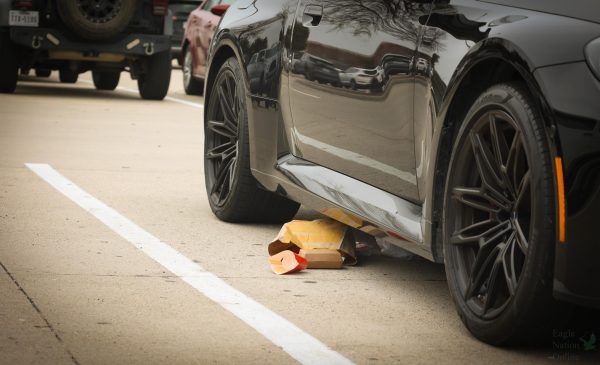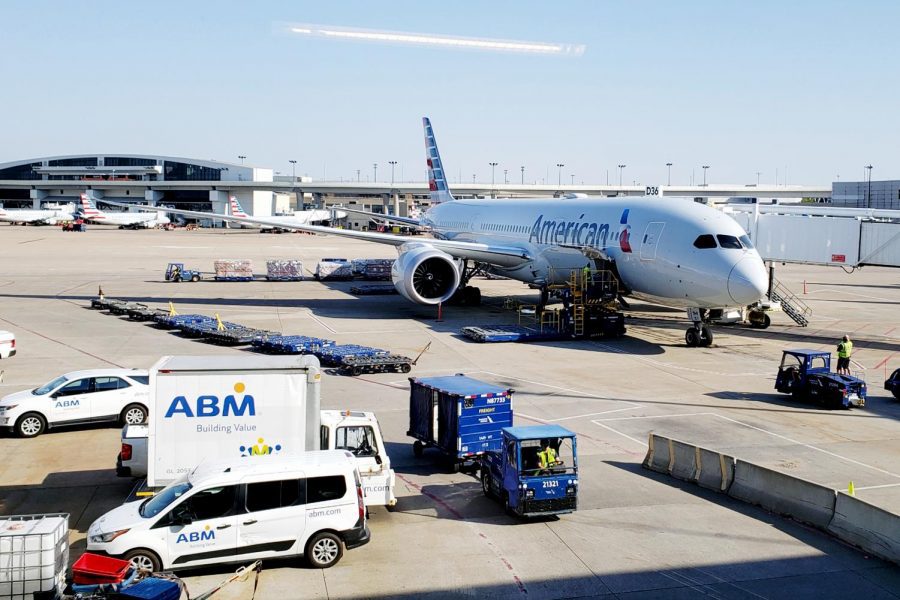Column: Lower-budget airlines could dictate holiday season, create more jobs
The sun rises at Dallas-Fort Worth International Airport as flight crews load up for the first flights of the day. Masked faces are seen throughout cabins and the airport to limit the spread of the virus on traveling passengers. “I am not afraid of traveling this holiday season,” Prosper resident Melissa Audia said. “Even though I decided to book my flights on the infamous Spirit Airlines.”
COVID-19 Effects on Air Travel
It is no secret that the “traveling-tourism” industry has struggled during the COVID-19 pandemic. In fact, in March 2020, when a wave of the virus swept throughout the United States ultimately causing many to fear the potential health concerns while traveling, the airline industry suffered more than a 30% loss in the stock market.
Many airlines acted quickly, and retired older airplanes, such as the McDonnell Douglas MD-80, which was retired by both American Airlines and Delta Airlines in worries of potential maintenance costs and passenger discomfort.
While American, Delta, Southwest, and United airlines requested and received government aid from a combined package agreed upon by the Trump administration and the legislative branch of the federal government, the airlines continue to fight tough battles against the fear of traveling.
While these “prime” corporations were digging through the dirt, eventually furloughing over 32,000 employees, lower-budget airlines seemed to recover quicker and more efficiently.
But what could come as a surprise – these lower-budget airlines could be the key to a COVID-19 economical recovery for the entire United States.
The Rebound of Lower-budget Airlines
For instance, Spirit Airlines – one of the worst-reviewed airlines in the nation, with poor customer relations that come at an unbeatable cost. During the early months of the pandemic, like every other airline, Spirit experienced a stock-market drop along with passenger fear and safety lawsuits.
But, what was quickly noticed was the recovery of the under-rated corporation. In fact, Spirit Airlines performed so well during the summer month of the pandemic that they confirmed many deals with the European Union’s Airbus, which is Spirit’s only aircraft manufacturer.
Spirit placed orders for new A320 NEO and A321 NEO aircrafts, and the company expects to double their 2019 fleet size despite the crippling industry.
What Does This Prove?
Even though the low-budget airline may receive ‘degrading’ reviews, it proves that the Americans who flew the airline were looking for cheap traveling options that weren’t necessarily the safest options during the pandemic.
Spirit Airlines, like all of the budget airlines, are flown and operated by highly-experienced pilots, gate agents, and of course, executive managers — but its response to COVID-19 is much like American Airlines’, which has been under attack since the beginning of the pandemic for having not requiring the use of all CDC-recommended guidelines.
All airlines now require masks onboard all flights at all times unless eating or drinking, but differently from Delta and Southwest, the Spirit and American Airlines corporations continue to book their flights to full capacity, which means that social distancing is almost non-existent.
While some may be worried about the potential limit on their public safety, many travelers believe there’s more to what the news is reporting:
“I am not afraid of traveling this holiday season, even though I decided to book my flights on the infamous Spirit Airlines,” Prosper resident Melissa Audia said. “I feel as if I am healthy, and the studies that have been shown have proven that, with the proper precautions, even without distancing onboard the plane, I have a very slim chance of potentially contracting the virus.”
Even before Boeing conducted safety studies about the HEPA air filters, the airlines clearly had their minds made up. But after multiple months of trials, even with Delta Airlines socially distancing its customers, both in the airport and on the plane, travelers are consistently choosing lower-budget airlines despite safety and service concerns.
Why?
The unbeatable low ticket prices.
“I decided to book through Spirit because of the value and itinerary that comes with the low cost,” Audia said. “You never know what the future will hold. It’s best to save the money and stay prepared.”
Since the beginning of the global pandemic, the government has struggled to find the best approach to limit the exposures of the virus and continue to keep the economy open. But the fear-mongering that citizens see in all of the media platforms has driven those desperate for vacations to stay at home, locked inside.
Even during Easter, families avoided gatherings in fear of potentially harming those they love. This has reached a relevant reality with Thanksgiving and Christmas on the horizon.
The two biggest holidays for family gatherings are projected to, obviously, bring an increased amount of virus cases, as well as deaths, but for families who have stayed locked inside for over six months, safe choices are slim.
How Lower-budget Airlines Can Bring Back the Economy
Fear, medical risks and employment struggles have increasingly affected the way that the airline industry is operating, even before the pandemic.
And with the virus still a relevant issue in our society, many citizens cannot afford to pay extra for traveling royalties, such as checked baggage, drinks, snacks, inflight-entertainment, and good customer service. In a hopeful watch, however, the expansion of Spirit Airlines, which also has a hub in the Dallas-Fort Worth airport, could bring about higher company morale and increased job opportunities.
So, even though families may be in a secured position in terms of jobs, wealth, food and education, travelers may still book seats for the lower-class airline. In fact, many others are doing the same out of potential investment into future savings, and we shouldn’t view this as a bad thing for the sake of our societal ‘norms.’
The expansion of these airlines will only promote good in the U.S. economy, giving society the backbone needed to recover from this virus and increase stable household situations.
Your donation will support the student journalists of Prosper High School. Your contribution will allow us to purchase equipment and cover our annual website hosting costs.

Honors & Awards:
Best of SNO – "Feline friendship, Instagram allows family to help soldier" with Amanda Hare.
Best of SNO – "Junior overcomes dancing accident, bone transplant" with Christi Norris.
Best of SNO – "Podcast: History’s Forgotten – Season 2 – Episode 1 – Charles Whittlesey" with Amanda Hare & Christi Norris.
Best of SNO – "Podcast: History’s Forgotten – Season 2 – Episode 3 – Veterans Day" with Amanda Hare & Christi Norris.
2021 TAJE Honorable Mention – Caption Writing
2021 TAJE Honorable Mention – Story Portfolio
2021 Academic All-State
TAJE Fall Fiesta Honorable Mention – Video News Story "ENN students share common goals, look forward to new season"






![Freshman Polly Greaves created this updated version of the original graphic through Canva. Their next episode reviews a science fiction novel, 'Ender's Game.' "I feel like [Orson Scott Card] did a really good job incorporating feelings into his words and the plot," Greaves said, "which really made it a work of art because I believe that good books are books that can make you feel something."](https://eaglenationonline.com/wp-content/uploads/2025/02/EndersGame_Cover3-600x420.png)







